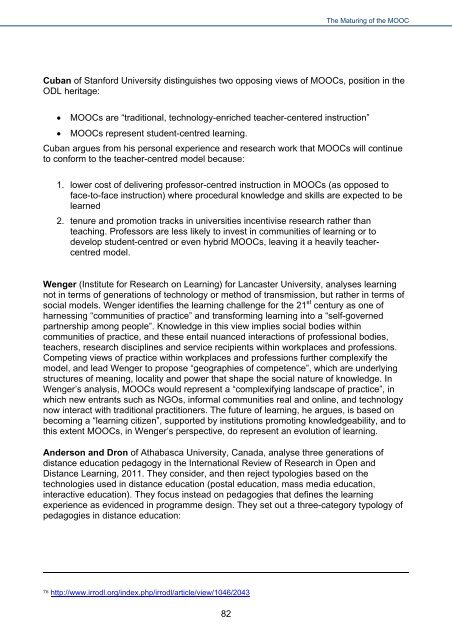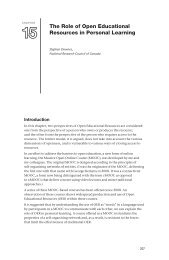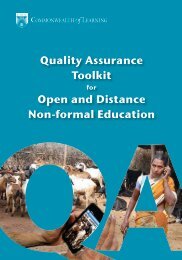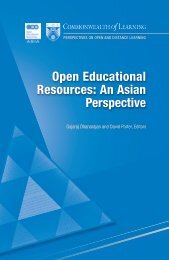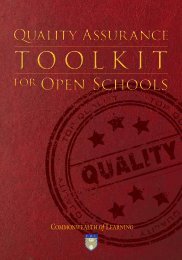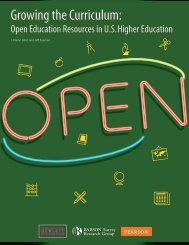The Maturing of the MOOC
The maturing of the MOOC: literature review of massive ... - Gov.uk
The maturing of the MOOC: literature review of massive ... - Gov.uk
- No tags were found...
You also want an ePaper? Increase the reach of your titles
YUMPU automatically turns print PDFs into web optimized ePapers that Google loves.
<strong>The</strong> <strong>Maturing</strong> <strong>of</strong> <strong>the</strong> <strong>MOOC</strong><br />
Cuban <strong>of</strong> Stanford University distinguishes two opposing views <strong>of</strong> <strong>MOOC</strong>s, position in <strong>the</strong><br />
ODL heritage:<br />
<strong>MOOC</strong>s are “traditional, technology-enriched teacher-centered instruction”<br />
<strong>MOOC</strong>s represent student-centred learning.<br />
Cuban argues from his personal experience and research work that <strong>MOOC</strong>s will continue<br />
to conform to <strong>the</strong> teacher-centred model because:<br />
1. lower cost <strong>of</strong> delivering pr<strong>of</strong>essor-centred instruction in <strong>MOOC</strong>s (as opposed to<br />
face-to-face instruction) where procedural knowledge and skills are expected to be<br />
learned<br />
2. tenure and promotion tracks in universities incentivise research ra<strong>the</strong>r than<br />
teaching. Pr<strong>of</strong>essors are less likely to invest in communities <strong>of</strong> learning or to<br />
develop student-centred or even hybrid <strong>MOOC</strong>s, leaving it a heavily teachercentred<br />
model.<br />
Wenger (Institute for Research on Learning) for Lancaster University, analyses learning<br />
not in terms <strong>of</strong> generations <strong>of</strong> technology or method <strong>of</strong> transmission, but ra<strong>the</strong>r in terms <strong>of</strong><br />
social models. Wenger identifies <strong>the</strong> learning challenge for <strong>the</strong> 21 st century as one <strong>of</strong><br />
harnessing “communities <strong>of</strong> practice” and transforming learning into a “self-governed<br />
partnership among people”. Knowledge in this view implies social bodies within<br />
communities <strong>of</strong> practice, and <strong>the</strong>se entail nuanced interactions <strong>of</strong> pr<strong>of</strong>essional bodies,<br />
teachers, research disciplines and service recipients within workplaces and pr<strong>of</strong>essions.<br />
Competing views <strong>of</strong> practice within workplaces and pr<strong>of</strong>essions fur<strong>the</strong>r complexify <strong>the</strong><br />
model, and lead Wenger to propose “geographies <strong>of</strong> competence”, which are underlying<br />
structures <strong>of</strong> meaning, locality and power that shape <strong>the</strong> social nature <strong>of</strong> knowledge. In<br />
Wenger’s analysis, <strong>MOOC</strong>s would represent a “complexifying landscape <strong>of</strong> practice”, in<br />
which new entrants such as NGOs, informal communities real and online, and technology<br />
now interact with traditional practitioners. <strong>The</strong> future <strong>of</strong> learning, he argues, is based on<br />
becoming a “learning citizen”, supported by institutions promoting knowledgeability, and to<br />
this extent <strong>MOOC</strong>s, in Wenger’s perspective, do represent an evolution <strong>of</strong> learning.<br />
Anderson and Dron <strong>of</strong> Athabasca University, Canada, analyse three generations <strong>of</strong><br />
distance education pedagogy in <strong>the</strong> International Review <strong>of</strong> Research in Open and<br />
Distance Learning, 2011. <strong>The</strong>y consider, and <strong>the</strong>n reject typologies based on <strong>the</strong><br />
technologies used in distance education (postal education, mass media education,<br />
interactive education). <strong>The</strong>y focus instead on pedagogies that defines <strong>the</strong> learning<br />
experience as evidenced in programme design. <strong>The</strong>y set out a three-category typology <strong>of</strong><br />
pedagogies in distance education:<br />
76 http://www.irrodl.org/index.php/irrodl/article/view/1046/2043<br />
82


